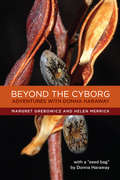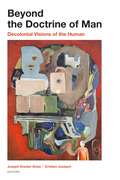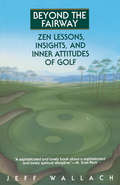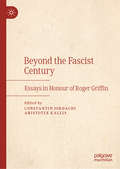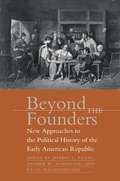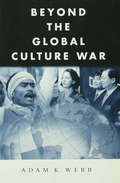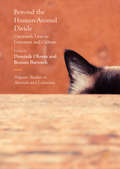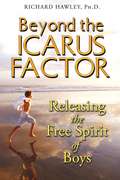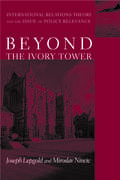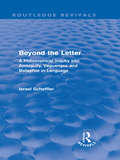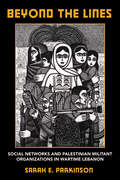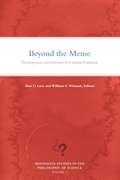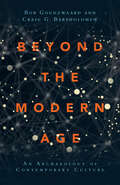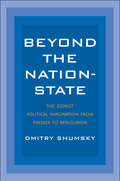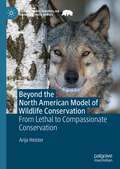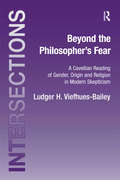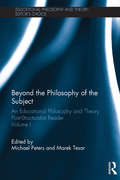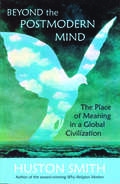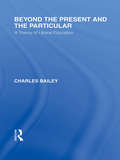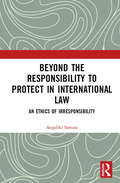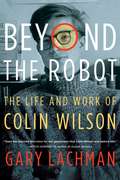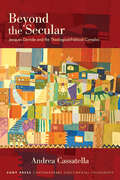- Table View
- List View
Beyond the Constitution
by Hadley ArkesHadley Arkes argues that it is necessary to move "beyond the Constitution," to the principles that stood antecedent to the text, if we are to understand the text and apply the Constitution to the cases that arise every day in our law.
Beyond the Cyborg: Adventures with Donna Haraway
by Margret Grebowicz Helen MerrickFeminist theorist and philosopher Donna Haraway has substantially impacted thought on science, cyberculture, the environment, animals, and social relations. This long-overdue volume explores her influence on feminist theory and philosophy, paying particular attention to her more recent work on companion species, rather than her "Manifesto for Cyborgs."Margret Grebowicz and Helen Merrick argue that the ongoing fascination with, and re-production of, the cyborg has overshadowed Haraway's extensive body of work in ways that run counter to her own transdisciplinary practices. Sparked by their own personal "adventures" with Haraway's work, the authors offer readings of her texts framed by a series of theoretical and political perspectives: feminist materialism, standpoint epistemology, radical democratic theory, queer theory, and even science fiction. They situate Haraway's critical storytelling and "risky reading" practices as forms of feminist methodology and recognize her passionate engagement with "naturecultures" as the theoretical core driving her work. Chapters situate Haraway as critic, theorist, biologist, feminist, historian, and humorist, exploring the full range of her identities and reflecting her commitment to embodying all of these modes simultaneously.
Beyond the Doctrine of Man: Decolonial Visions of the Human
by Joseph Drexler-Dreis and Kristien JustaertCatalyzed by Sylvia Wynter’s questioning of modern/colonial descriptions of the human person, the essays in Beyond the Doctrine of Man interrogate the problem of these definitions of the human person and take up the struggle to decolonize and unsettle such descriptions.Contributors: Rufus Burnett Jr., M. Shawn Copeland, Yomaira C. Figueroa, Patrice Haynes, Xhercis Méndez, Andrew Prevot, Mayra Rivera, Linn Marie Tonstad, Alexander G. Weheliye
Beyond the Fairway: Zen Lessons, Insights, and Inner Attitudes of Golf
by Jeff WallachBeyond The Fairwayis a guide for getting to the heart of golf and self by measuring a not by the score, but by the overall experience. Going against conventional approaches to golf, disproving that a straight fairway drive is golf's ultimate thrill, golfer and author Jeff Wallach steers his cart into the rough and even dangerous terrain where golf becomes an adventure into the unknown, into the greater mysteries of life, love, friendship, endurance, being a son, and being a man. Each chapter presents the unique physical and spiritual challenges of exotic and exclusive courses around the world from Scotland, Africa, and Thailand to Oregon, Alaska, and Nepal. The book gives an insider's often humorous, sometimes irreverent perspective on the sacred sites and rites of golf, and pros from around the world provide practical tips and insights into the game.
Beyond the Fascist Century: Essays in Honour of Roger Griffin
by Aristotle Kallis Constantin IordachiThis book evaluates the current and future state of fascism studies, reflecting on the first hundred years of fascism and looking ahead to a new era in which fascism studies increasingly faces fresh questions concerning its relevance and the potential reappearance of fascism. This wide-ranging work celebrates Roger Griffin’s contributions to fascism studies – in conceptual and definitional terms, but also in advancing our understanding of fascism – which have informed related research in a number of fields and directions since the 1990s. Bringing together three ‘generations’ of fascism scholars, the book offers a combination of broad conceptual essays and contributions focusing on particular themes and facets of fascism. The book features chapters, which, although diverse in their approaches, explore Griffin’s work while also engaging critically with other schools of thought. As such, it identifies new avenues of research in fascism studies, placing Griffin’s work within the context of new and emerging voices in the field.
Beyond the Founders
by Jeffrey L. Pasley David Waldstreicher Andrew W. RobertsonIn pursuit of a more sophisticated and inclusive American history, the contributors to Beyond the Founders propose new directions for the study of the political history of the republic before the Civil War. In ways formal and informal, symbolic and tactile, this political world encompassed blacks, women, entrepreneurs, and Native Americans, as well as the Adamses, Jeffersons, and Jacksons, all struggling in their own ways to shape the new nation and express their ideas of American democracy.Taking inspiration from the new cultural and social histories, these political historians show that the early history of the United States was not just the product of a few "founding fathers," but was also marked by widespread and passionate popular involvement; print media more politically potent than that of later eras; and political conflicts and influences that crossed lines of race, gender, and class.Contributors:John L. Brooke, The Ohio State University Andrew R. L. Cayton, Miami University (Ohio)Saul Cornell, The Ohio State UniversitySeth Cotlar, Willamette UniversityReeve Huston, Duke University Nancy Isenberg, University of TulsaRichard R. John, University of Illinois at ChicagoAlbrecht Koschnik, Florida State University Rich Newman, Rochester Institute of TechnologyJeffrey L. Pasley, University of Missouri, ColumbiaAndrew W. Robertson, City University of New YorkWilliam G. Shade, Lehigh UniversityDavid Waldstreicher, Temple UniversityRosemarie Zagarri, George Mason University
Beyond the Global Culture War
by Adam K. Webb"Beyond the Global Culture War" presents a cross-cultural critique of global liberalism and argues for a broad-based challenge that can meet it on its own scale. Adam Webb is one of our most exciting and original young scholars, and this book is certain to generate many new debates. This timely volume probes many of the key challenges we face in the new millennium. This is essential reading for all students of politics and globalization.
Beyond the Human-Animal Divide: Creaturely Lives in Literature and Culture (Palgrave Studies in Animals and Literature)
by Dominik Ohrem Roman BartoschThis volume explores the potential of the concept of the creaturely for thinking and writing beyond the idea of a clear-cut human-animal divide, presenting innovative perspectives and narratives for an age which increasingly confronts us with the profound ecological, ethical and political challenges of a multispecies world. The text explores written work such as Samuel Beckett's Worstward Ho and Michel Foucault's The Order of Things, video media such as the film "Creature Comforts" and the video game Into the Dead, and photography. With chapters written by an international group of philosophers, literary and cultural studies scholars, historians and others, the volume brings together established experts and forward-thinking early career scholars to provide an interdisciplinary engagement with ways of thinking and writing the creaturely to establish a postanthropocentric sense of human-animal relationality.
Beyond the Icarus Factor: Releasing the Free Spirit of Boys
by Richard HawleyA call to reconsider the place of boys in the family, schools, and community institutions that rob them of their inborn vitality and creativity • Argues that boys have a unique free-spirit nature and that efforts to alter or suppress it lead to profound unhappiness, pathology, or startling compulsions • Demands another approach to societal expectations, one that values and promotes the daring creativity of boys Richard Hawley’s many years as headmaster of a boys’ school have convinced him that boys do indeed have a unique, intrinsic, and inalienable free-spirit nature. He sees deep flaws in the way we--as parents, educators, and community members--alter or suppress that true nature in order to turn boys into men that fit our societal template. Hawley argues that the “model man” in our society, while seemingly successful in his role, may yet be unhappy in his life. The very elements that we strip away from a boy’s natural tendencies are the sources of spirituality and vitality that can give his life both meaning and satisfaction. Without these, he is lost to his essential nature.A new approach is needed, says Hawley, and he goes to the roots of Western theology and philosophy to locate what has gone wrong and how those consequences might be addressed. He sounds the clarion call to unleash, promote, and celebrate the seemingly dangerous pursuits that reflect the creativity and daring nature of boys. Fantasy and imagination must trump cognition and problem solving. We must not hold our boys back with our fears of failure but give them the tools and support they need to create wings good enough to fly wherever they wish to go.
Beyond the Ivory Tower: International Relations Theory and the Issue of Policy Relevance
by Miroslav Nincic Joseph LepgoldThe gap between academics and practitioners in international relations has widened in recent years, according to the authors of this book. Many international relations scholars no longer try to reach beyond the ivory tower and many policymakers disdain international relations scholarship as arcane and irrelevant. Joseph Lepgold and Miroslav Nincic demonstrate how good international relations theory can inform policy choices. Globalization, ethnic conflict, and ecological threats have created a new set of issues that challenge policymakers, and cutting-edge scholarship can contribute a great deal to the diagnosis and handling of potentially explosive situations.
Beyond the Letter: A Philosophical Inquiry into Ambiguity, Vagueness and Methaphor in Language (Routledge Revivals)
by Israel SchefflerAmbiguity, vagueness and metaphor are pervasive features of language, deserving of systematic study in their own right. Yet they have frequently been considered mere deviations from ideal language or obstacles to be avoided in the construction of scientific systems. First published in 1979, Beyond the Letter offers a consecutive study of these features from a philosphical point of view, providing analyses of each and treating their relations to one another. Addressed to the fundamental task of logical and semantic explanation, the book employs an inscriptional methodology in the attempt to avoid prevalent forms of question-begging, and, further, in the conviction that sparseness of assumption often reveals points of theoretical interest irrespective of methodolgical preference. The author distinguishes and analyses several varieties of ambiguity, developing new semantic notions in the process; recasts the philosophical treatment of vagueness in the light of recent criticisms of analyticity; discusses the bearing of vagueness on logic; and provides a systematic critique of major recent interpretations of metaphor, developing a revised version of contextualism.
Beyond the Lines: Social Networks and Palestinian Militant Organizations in Wartime Lebanon
by Sarah E. ParkinsonBeyond the Lines explores the social underpinnings of rebel adaptation and resilience. How do rebel groups cope with crises such as repression, displacement, and fragmentation? What explains changes in militant organizations' structures and behaviors over time? Drawing on nearly two years of ethnographic research, Sarah E. Parkinson traces shifts in Palestinian militant groups' internal structures and practices during the civil war of 1975 to 1990 and foreign occupations of Lebanon. She shows that most militants approach asymmetrical warfare as a series of challenges centered around information and logistics, characterized by problems such as supplying constantly mobile forces, identifying collaborators, disrupting rival belligerents' operations, and providing essential services like healthcare. Effective negotiation of these challenges contributes to militant organizations' resilience and survival. In this context, the foundation of rebel resilience lies with militants' ability to repurpose their everyday social networks to organizational ends. In the Lebanese setting, Beyond the Lines demonstrates how regionalized differences in Israeli, Syrian, and Lebanese deployment of violence triggered distinct social network responses that led to divergent organizational outcomes for Palestinian militants.
Beyond the Meme: Development and Structure in Cultural Evolution (Minnesota Studies in the Philosophy of Science #22)
by William C. Wimsatt Alan C. LoveInterdisciplinary perspectives on cultural evolution that reject meme theory in favor of a complex understanding of dynamic change over time How do cultures change? In recent decades, the concept of the meme, posited as a basic unit of culture analogous to the gene, has been central to debates about cultural transformation. Despite the appeal of meme theory, its simplification of complex interactions and other inadequacies as an explanatory framework raise more questions about cultural evolution than it answers. In Beyond the Meme, William C. Wimsatt and Alan C. Love assemble interdisciplinary perspectives on cultural evolution, providing a nuanced understanding of it as a process in which dynamic structures interact on different scales of size and time. By focusing on the full range of evolutionary processes across distinct contexts, from rice farming to scientific reasoning, this volume demonstrates how a thick understanding of change in culture emerges from multiple disciplinary vantage points, each of which is required to understand cultural evolution in all its complexity. The editors provide an extensive introductory essay to contextualize the volume, and Wimsatt contributes a separate chapter that systematically organizes the conceptual geography of cultural processes and phenomena.Any adequate account of the transmission, elaboration, and evolution of culture must, this volume argues, recognize the central roles that cognitive and social development play in cultural change and the complex interplay of technological, organizational, and institutional structures needed to enable and coordinate these processes.Contributors: Marshall Abrams, U of Alabama at Birmingham; Claes Andersson, Chalmers U of Technology; Mark A. Bedau, Reed College; James A. Evans, U of Chicago; Jacob G. Foster, U of California, Los Angeles; Michel Janssen, U of Minnesota; Sabina Leonelli, U of Exeter; Massimo Maiocchi, U of Chicago; Joseph D. Martin, U of Cambridge; Salikoko S. Mufwene, U of Chicago; Nancy J. Nersessian, Georgia Institute of Technology and Harvard U; Paul E. Smaldino, U of California, Merced; Anton Törnberg, U of Gothenburg; Petter Törnberg, U of Amsterdam; Gilbert B. Tostevin, U of Minnesota.
Beyond the Modern Age: An Archaeology of Contemporary Culture
by Craig G. Bartholomew Bob GoudzwaardBeyond the Modern AgeBeyond the Modern AgeBeyond the Modern Age
Beyond the Nation-State: The Zionist Political Imagination from Pinsker to Ben-Gurion
by Dmitry ShumskyA revisionist account of Zionist history, challenging the inevitability of a one-state solution, from a bold, path-breaking young scholar The Jewish nation-state has often been thought of as Zionism’s end goal. In this bracing history of the idea of the Jewish state in modern Zionism, from its beginnings in the late nineteenth century until the establishment of the state of Israel, Dmitry Shumsky challenges this deeply rooted assumption. In doing so, he complicates the narrative of the Zionist quest for full sovereignty, provocatively showing how and why the leaders of the pre-state Zionist movement imagined, articulated and promoted theories of self-determination in Palestine either as part of a multinational Ottoman state (1882-1917), or in the framework of multinational democracy. In particular, Shumsky focuses on the writings and policies of five key Zionist leaders from the Habsburg and Russian empires in central and eastern Europe in the late nineteenth and early twentieth centuries: Leon Pinsker, Theodor Herzl, Ahad Ha’am, Ze’ev Jabotinsky, and David Ben-Gurion to offer a very pointed critique of Zionist historiography.
Beyond the Natural Body: An Archaeology of Sex Hormones
by Nelly OudshoornFirst Published in 2004. Routledge is an imprint of Taylor & Francis, an informa company.
Beyond the North American Model of Wildlife Conservation: From Lethal to Compassionate Conservation (The Palgrave Macmillan Animal Ethics Series)
by Anja HeisterThe North American Wildlife Conservation Model (NAM) is the driver of a strong anthropocentric stance, which has legalized an ongoing, annual exploitation of hundreds of millions of wild animals, who are killed in the United States through trapping, hunting and other lethal practices. Increasingly, the American public opposes the killing of wild animals for recreation, trophies and profit but has little—if any—knowledge of the Model. The purpose of this book is to empower the public with knowledge about the NAM’s insufficiencies and to help expedite the shift from lethal to compassionate conservation, an endeavour urgently needed particularly under the threats of climate change, human population growth and accelerating plant and animal species extinctions.With a focus on trapping, this book exposes the NAM's belief in human supremacy and its consequences for wild animals and their ecosystems, the same value that is driving the ongoing global destruction of nature and accelerating species extinction. Motivated by a deep concern for wild animals who suffer and whose lives are extinguished each year by 'sportsmen and women', this book exposes the violent treatment of wild animals inherent in governmental-promoted hunting and trapping programs, while emphasizing the importance of empathy and compassion for other animals in conservation and in our lives.
Beyond the Philosopher's Fear: A Cavellian Reading of Gender, Origin and Religion in Modern Skepticism (Intersections: Continental and Analytic Philosophy)
by Ludger H. Viefhues-BaileyBased on a detailed analysis of gender in Stanley Cavell's treatment of the skeptical problem, this book addresses the relationship between gender and religion in modern skepticism. Engaging in dialogue with Julia Kristeva's philosophy, Viefhues claims that a religious problem underlies Cavell's understanding of the feminine. The feminine which the skeptic fears is construed as a placeholder for the beyond, marking the transcendence of our origins which are elusive yet at the same time part of ourselves. It is argued that a religious question of origins thus lies at the heart of the modern skeptical problem.
Beyond the Philosophy of the Subject: An Educational Philosophy and Theory Post-Structuralist Reader, Volume I (Educational Philosophy and Theory: Editor’s Choice)
by Michael A Peters Marek TesarThis first volume focuses on a collection of texts from the latter twenty years of Educational Philosophy and Theory, selected for their critical status as turning points or important awakenings in post-structural theory. In the last twenty years, the applications of the postmodern and poststructuralist perspectives have become less mono-focused, less narrowly concerned with technical questions and also less interested in epistemology, and more interested in ethics. This book covers questions of genealogy, ontology, the body and the institution, giving examples of theoretical applications of post-structural theory that testify to the generative and endlessly applicable potential of this work to different fields and avenues of thought. While informed by Foucault's thinking of the political subjugation of docile bodies to individuals as self-determining beings, the chapters in this book culminate in amalgamations of different schools of educational philosophy, which explore poststructuralist approaches to education. Beyond the Philosophy of the Subject will be key reading for academics, researchers and postgraduate students in the fields of philosophy of education, philosophy, education, educational theory, post-structural theory, the policy and politics of education, and the pedagogy of education.
Beyond the Postmodern Mind
by Huston SmithThe limits of science in discerning Ultimate Reality have brought Westerners to "as sharp an impasse in history as we have faced," says Huston Smith. This edition of critically acclaimed essays explores possible breakthroughs in the direction of reaching a liberated and enlightened consciousness. With a new preface and new final chapter."An invaluable collection of essays by the foremost religious writer in America today." -- Ken Wilber
Beyond the Postmodern Mind
by Huston SmithThis new edition of acclaimed essays explores sea changes in the relationship between religion and science over the course of Western culture and suggest possible breakthroughs toward reaching an enlightened consciousness.
Beyond the Present and the Particular (International Library of the Philosophy of Education Volume 2): A Theory of Liberal Education
by Charles H. BaileyCharles Bailey advances a modern characterization and justification of liberal education and defends such a view of liberal education against contemporary challenges. The book will be of special value to those guiding educational policy, designing curricula and reflecting on their own teaching practice. An introductory part of the book describes the need for justification and the special nature of liberal education as compared with other characterizations of education in utilitarian terms. The author offers a positive account of the content of liberal education, after a consideration and critique of the work of Paul Hirst, Philip Phenix and John White and follows this with an account of teacher strategy, attitude and methodology appropriate to liberal education. The final part of the book describes contemporary trends and challenges to the idea of liberal education and shows how they fail to provide a coherent alternative to liberal education as a basis for universal compulsory education.
Beyond the Responsibility to Protect in International Law: An Ethics of Irresponsibility
by Angeliki SamaraThis book offers a critical appraisal of the international legal idea of the ‘Responsibility to Protect’. The idea that the international community has a responsibility to protect populations at risk has become the prominent mode and structure of address in response to mass human atrocities, gross human rights violations, and large-scale loss of life. Although the "international community" of liberal international law and of legal cosmopolitanism for the most part projects a self-assured collective project, this book maintains that it transforms global ethical responsibility into a project of governance, management, and control. Pursuing this argument, and drawing on critical legal literature, critical international relations and on ideas of responsibility and ethical relationality in the work of Jacques Derrida and Judith Butler, the book develops a concept of "irresponsibility". This concept is then juxtaposed to the dominant Responsibility to Protect discourse. By exposing and acknowledging "the sites of irresponsibility" of the Responsibility to Protect, the book argues that irresponsibility itself can become the condition of ethical responsibility and the possibility of justice. This original approach to an increasingly important topic will prove invaluable to those working in international law, international relations, politics and legal theory.
Beyond the Robot: The Life and Work of Colin Wilson
by Gary LachmanHistorian Gary Lachman delivers a fascinating, rollicking biography of literary and cultural rebel Colin Wilson, one of the most adventurous, hopeful, and least understood intellects of the past century.You will embark on the intellectual ride of a lifetime in this rediscovery of the life and work of writer, rebel, and social experimenter Colin Wilson (1931-2013).Author of the classic The Outsider, Wilson, across his 118 books, purveyed a philosophy of mind power and human potential that made him one of the least understood and most important voices of the twentieth century. Wilson helped usher in the cultural revolution of the 1960s with his landmark work, The Outsider, published in 1956. The Outsider was an intelligent, meticulous, and unprecedented study of nonconformity in all facets of life. Wilson, finally, became a prolific and unparalleled historian of the occult, providing a generation of readers with a responsible and scholarly entry point to a world of mysteries. Now, acclaimed historian Gary Lachman, a friend of Wilson and a scholar of his work, provides an extraordinary and delightful biography that delves into the life, thought, and evolution of one of the greatest intellectual rebels and underrated visionaries of the twentieth century.From the Trade Paperback edition.
Beyond the Secular: Jacques Derrida and the Theological-Political Complex (SUNY series in Contemporary Continental Philosophy)
by Andrea CassatellaThrough an in-depth, critical analysis of Jacques Derrida's later writings, Beyond the Secular examines the contemporary nexus between religion and politics. Reconnecting these writings to his early works, Andrea Cassatella explores distinctive topics that are thematically linked by the theological-political problematic and theoretically informed by Derrida's relational approach to language, time, religion and politics. The result is a critical investigation into under-examined assumptions of modern secular discourse that questions its binary logics and illuminates such discourse's exclusionary character by tracing its roots in racialized understandings about language, epistemology, politics and religion that travel worldwide through global processes of assimilatory translation. By exposing the discriminatory hierarchies that the Western-Christian, sexualized, and racialized presuppositions of secular discourse keep producing and maintaining, Cassatella ultimately sheds light on the deep entanglements of secularism with the legacy of race and colonialism.

